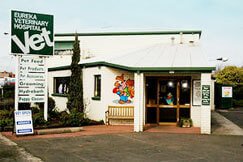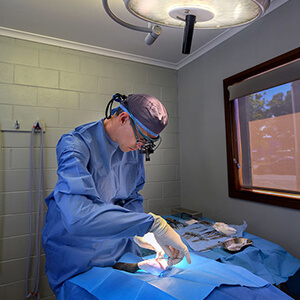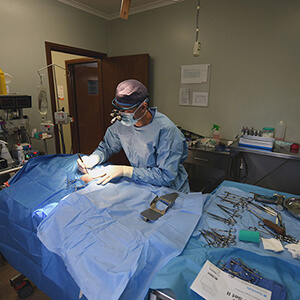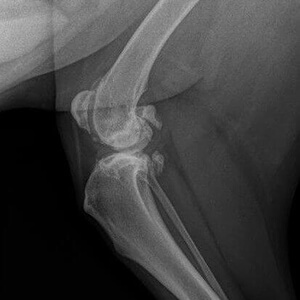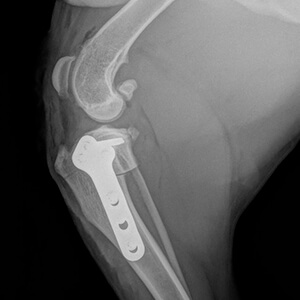After Hours
0408 512 323
Cruciate Ligament Surgery for Dogs
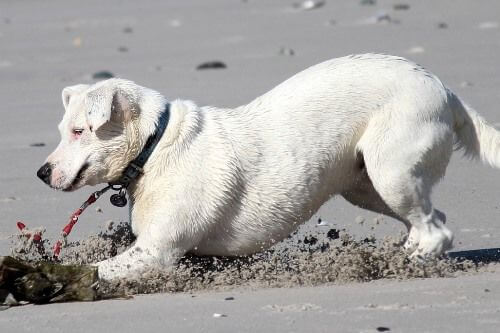 Expert TPLO surgery right here in Ballarat
Expert TPLO surgery right here in Ballarat
Has this happened to you?
Your dog is running happily at the park, only to suddenly return holding up one of their back legs. They're not putting weight on it, and you know something’s not right. You visit the vet — the right thing to do — and are told your dog may have a ruptured cruciate ligament.
From here, things can feel overwhelming. You’re hearing about radiographs, knee instability, and possible surgery. Naturally, you’re wondering:
What does this mean? Does my dog really need surgery? Can this be treated locally?
At Eureka Veterinary Clinic, we’re here to guide you through it with expertise, compassion, and care.
What is a cruciate rupture?
The cranial cruciate ligament (CCL) is one of the key structures that stabilise a dog’s knee. When this ligament is torn or ruptured — often from gradual wear and tear rather than sudden trauma — the knee becomes unstable. This leads to pain, swelling, and eventually arthritis if not treated.
Cruciate injuries are one of the most common orthopaedic issues we see in dogs, especially medium to large breeds.
Are X-rays necessary?
Yes — radiographs (X-rays) help confirm the diagnosis and rule out other problems that can cause similar signs, including arthritis, bone fragments, infection, fractures, or even bone cancer.
These X-rays are taken under a short general anaesthetic so we can also perform a safe, pain-free examination of the knee and assess for instability — especially helpful in partial ligament tears where instability might not be obvious.
Our Recommended Treatment: TPLO Surgery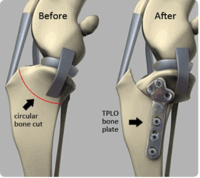
For dogs over 10kg — and especially active, medium to large breed dogs — surgery is almost always recommended to restore knee stability and minimise long-term arthritis.
At Eureka Veterinary Clinic in Ballarat, we offer Tibial Plateau Levelling Osteotomy (TPLO) as our preferred and standard procedure for cruciate ligament injuries.
Why TPLO?
It’s the gold standard for stabilising the knee after cruciate rupture
- It provides strong, dynamic joint stability
- It leads to better long-term mobility and less arthritis
- Dogs generally recover faster and return to normal activity sooner
No Need to Travel to Melbourne
Unlike some clinics in the region who refer cruciate cases to Melbourne surgical centres, we perform TPLO surgery right here in Ballarat — meaning:
- No long-distance travel
- No external referral costs
- Surgery and follow-up care all under one roof
- The same trusted team throughout your dog’s treatment and recovery
Our surgical team is experienced in performing TPLO procedures with excellent outcomes. We use advanced monitoring, pain management, and rehabilitation advice to support every step of your dog’s recovery.
What about smaller dogs or partial tears?
For smaller dogs (under 10kg) or dogs with partial cruciate ruptures, we may trial non-surgical management first. This could include:
Rest and controlled exercise
- Anti-inflammatory medications
- Joint-protective injections (Cartrophen or Synovan)
- Physiotherapy or acupuncture
If these approaches aren’t successful, surgery may still be the best option — and we’ll help you decide the right course for your pet.
Book a Consultation
If your dog has injured their cruciate ligament — or you’ve been referred elsewhere for a TPLO — speak to us first. We’re proud to offer specialist-level surgical care right here in Ballarat.
📞 Call us on (03) 5333 5959 to book an appointment or get a second opinion.
CLICK HERE for available times and bookingsBOOK ONLINE >
Location
